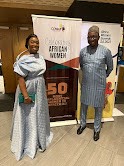By Amin Kef (Ranger)
Board Chairperson of the National Revenue Authority (NRA), who is held in high esteem for her influential roles in national development, Mrs Tuma Adama Gento-Kamara has called for the empowerment and protection of women in Africa.
“I have come to realize that I have a duty to ignite and inflame women to action, because the global trends on women’s issues require dedicated candidates who are convinced of their mission to emancipate womanhood first in Africa and elsewhere around the world,” she stated
Tuma Adama Gento-Kamara was inspiring women during her keynote address at the 4th Edition of the Africa Women Summit and launch of the 50 Most Influential Women in Africa Magazine during an auspicious event took place at the Century City Conference Centre, Cape Town, South Africa on the 12th May, 2023.
Speaking on the theme: “African Women: The World is Waiting for you to Shine,” Tuma Gento-Kamara’s speech was a call to action for women in Africa.
Her audience comprised of female Ministers of Governments, Senators, and entrepreneurs. She made a clarion call for the empowerment and protection of women in Africa. A Gala and Awards ceremony also formed part of the event.
She told her audience that, “this event is so important to me that I going to attack my theme from a different perspective as I am going to sound more like a provocateur to fire up some lionesses here in this room.”
The NRA Board Chairperson informed her audience further that the African Development Bank’s Gender Data Index of 2019 suggests that a prevalence of intimate partner sexual or physical violence ranges from a little over 10% to close to 40% across Africa, which is among the highest globally. She noted that when we say the world is waiting for African Women to shine, “we meant to wake up a sleeping giant to act in a certain way.”
She went on to say that in 2021 alone, around 45,000 women and girls worldwide were killed by their intimate partners or other family members. “This means, on average, more than five women or girls are killed every hour by someone in their own family.”She added that sometimes women are targeted due to their political and social orientations. “We cannot apportion blame, but one of us who attended this event last year is no more. She was a vibrant young woman with high hopes and aspirations. Madam Juweira Ibrahim was shot and killed by a Police Officer. May her Blessed Soul Rest in Peace.”
She warned that, “the neglect of today will be the guilt of tomorrow if we fail to act now.”
According to her, she came to realize that she has a duty to ignite and inflame women to action, adding that the global trends on women’s issues require dedicated candidates who are convinced of their mission to emancipate womanhood first in Africa and elsewhere around the world.
She told her attentive audience that the world has waited long for women to arrive, “now that you are here, among the 50 most influential women in Africa, what can you do?”She further rhetorically asked: “What can you do to champion the more than 9 million girls between the ages of about 6 and 11 across this continent who would probably never go to school in our lifetime?” She stated that among these girls are promising leaders, talented individuals who will change the cause of history if women were to act today.
She went further to say that she agrees entirely with Maya Angelou who once said that, “Life is not measured by the number of breaths we take, but by the moments that take our breath away”. She said that this call to action lingers centuries across the course to restore the dignity of womanhood across the African Continent. She said homage must be paid to the women who went ahead of, who never gave up but played their parts and now have handed the baton to the today’s women.
She used the platform to ask questions of the women: “What can we do when about 40% of global average pregnancies are teenage pregnancies and 50% of them end up in abortion, 38% result in births but are not adequately catered for? What can we do? What can we do when it is clear to all in this room that women receive lower medical care than men?
She recalled that according to the World Bank, over one billion women hardly have legal protection against domestic sexual violence or economic violence.
She added that in many countries, there’s a lack of legal protection against harassment in the workplace, in schools, and in public. “I read somewhere that all national Parliaments at the beginning of 2019 only have 24.3% of seats filled by women. As of June 2019, 11 Heads of State were women. Despite progress in this area over the years, women are still grossly under-represented in Government and the political process. This means that certain issues that female politicians tend to bring up are often neglected. The question again is what can you do over and above the meetings, the communiqués, and the advocacies? I reckon the emergence of an awakening in the hearts and minds of women everywhere on these issues.”
She noted that in Sierra Leone, women have come a long way in the fight for an environment that will guarantee women’s right, women’s participation in politics, and gender equality. She added that the Government of Sierra Leone recently enacted into Law the Gender Equality and Women’s Empowerment Bill ensuring active participation of women in governance. She informed her audience that the Act establishes a 30 percent quota for women’s participation in Government for both appointed positions, including Cabinet, Ministerial, Ambassadorial roles, and elected positions, such as Parliamentary and Local Council seats. She added that, the quota in the Bill goes into effect ahead of Sierra Leone’s upcoming Presidential, Parliamentary and Municipal elections on June 23, 2023.
She went on to inform her colleagues that the world is waiting for expert women to work towards the decade on achieving Financial and Economic Inclusion for African Women.
Tuma noted that this inclusion is such that every woman must be able to work, be paid and participate in the economy of her country. “We can’t achieve this overnight, it involves examining the regulatory, legislative, and policy context of our various countries to determine the changes needed to foster women’s financial inclusion and assist financial institutions in adopting approaches tailored to women, as a separate market segment.”
She went further to state that women make up 58 per cent of Africa’s self-employed population but that women make 34 per cent less money than men do in the same category. “In this continent, women are still under-represented in decision-making, and we need to figure out the best way to make sure they are more represented. Women are discriminated against in all areas; they have insufficient access to finances or land ownership. Women entrepreneurs don’t even have access to Government tenders; women-owned businesses in sub-Saharan Africa win only an estimated one per cent of public procurement contracts. Personally, this is an upset for me because the answer to these problems across this continent is in this room.”
According to Tuma Gento-Kamara, in 2021, the Global Gender Gap index benchmarked 156 countries, providing a tool for cross-country comparison and to prioritize the most effective policies needed to close gender gaps. Globally, the average distance completed to parity is at 68%, a step back compared to 2020. These figures, she said are mainly driven by a decline in the performance of large countries. On its current trajectory, it will now take 135.6 years to close the gender gap worldwide.
She went further to state that according to the report, the gender gap in Political Empowerment remains the largest with only 22% to date and that at the current rate of progress, the World Economic Forum estimates that it will take 145 years to attain gender parity in politics, 267 years to close the gap on Economic Participation and Opportunity and14 years to close the gap on Educational Attainment and Health and Survival.
She told the women present that she wants to believe that women of Africa have heard the world calling out for action. She added that they would be leaving this event believing that they have one Africa and that their problems are the same.
Before concluding her speech, Tuma Gento-Kamara congratulated the recipients of awards which would automatically position them as Ambassadors to an excited continent, a continent of readiness and hope. She however hastened to remind the women present that the African continent has been described as a continent of despair, a continent where over 278 million people are undernourished, a continent where 55% of its children under the age of five are stunted due to severe malnutrition.
“As you receive these prestigious recognitions, please be aware that some women somewhere are starving, some in need of access to safe drinking water, others wanting a seed capital to start up a business venture. If they have to do that, they are currently waiting on you to take action. Without you we are going to lose a portion of womanhood that could only be reached through you,” she admonished the awardees and further urged them to dream big but not to allow the sizes of their hearts to limit their dreams.
As a woman who has shown exceptional leadership and achievement and is tirelessly driving impact toward sustainable development in Sierra Leone and Africa as a whole, Tuma Gento-Kamara’s presence at the conference was described by participants as a testament to her support for the advancement of women in Africa.
The distribution of awards to deserving African women climaxed the event.





